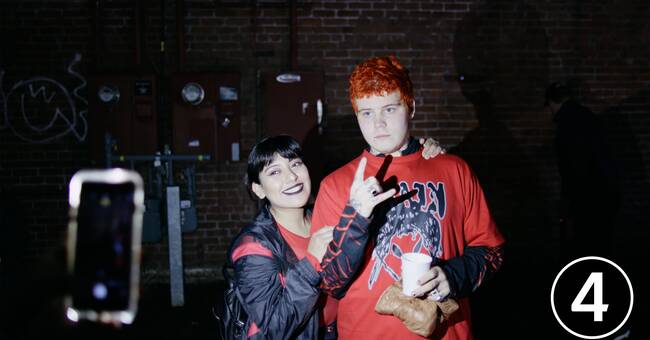Yung Lean must be
protected at all costs.
After this excellent documentary about Jonatan Leandoer Håstad, this should be the highest priority.
The rapper from Stockholm, together with his gang of Sad Boys, created a new sound and an aesthetic completely disconnected from any Swedish musical tradition.
"I come
from Stockholm and I do not think it affects how my music sounds at all, except that it sounds more sad, Stockholm is a sad city."
That's what Leandoer says in his first interview after suddenly becoming a viral phenomenon, still a teenager.
The quote illustrates the role that the internet played, more than geographical domicile, for generation Z's artists.
Henrik Burman's documentary In my head follows Leandoer's journey from growing up in a cultural family in Stockholm to lightning - fast rock star success in the early 10's, down in a dark spiral of drugs and depression and then back on his feet.
Yung Lean broke
through before the concept of "soundcloudrap" was born, but his sluggish emo rapping explored similar themes of alienation, depression and aggressive hedonism that defined American hip hop in recent years.
The beats were run in a cement mixer with different genres and spiced with a fetishization of American products.
The emotional lyrics as well as the lack of respect for conventions became a hallmark of rappers like XXXTentacion, Juice WRLD and Lil Peep, who all became hugely successful, lived hard and died young.
The same fate befell
Yung Lean when he recorded a record in Miami and the drugs led to a psychosis, a trip to the psyche and one of his friends and tour manager, Barron Machat from the record company Hippos in tanks, died in a car crash.
The documentary is objective about the tragedy that created a conflict between Yung Lean's band and Machat's father, who believed that Leandoer and his entourage were to blame for his son's death.
Much of the material from the first US tours comes from the band themselves and gives a unique sense of presence when the party goes from ecstatic to destructive.
The culture clash when
Swedish resentment is remixed with the dream of American borderlessness is at first seductive but is replaced by an unpleasant fixation.
"We have to fix crystal meth before we leave the south," says producer God when the tour bus stops, and goes on to say that he would exchange his life for drugs.
In my head is the opposite of the cheeky PR products that have become the more common form of music documentary in recent years.
Instead of sweeping the darkness under the carpet, Henrik Burman wants to go to the bottom with all the trauma.
Lean attracted
an army of young people who saw his music as therapy in a world without possibilities.
Some of them are interviewed in In my head, including some super fans who saved for a whole year to travel from Russia to New York to see him live.
At a time when you can barely leave home, it is extra touching to see.

